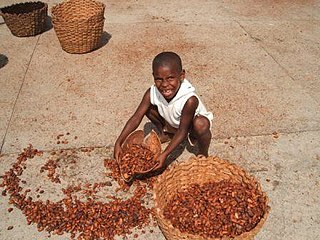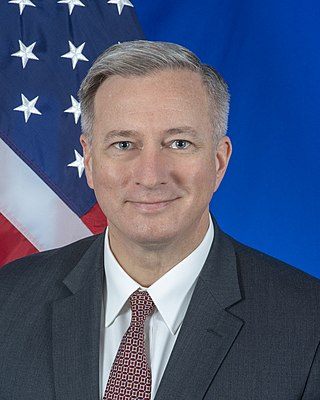Related Research Articles

Debt bondage, also known as debt slavery, bonded labour, or peonage, is the pledge of a person's services as security for the repayment for a debt or other obligation. Where the terms of the repayment are not clearly or reasonably stated, the person who holds the debt has thus some control over the laborer, whose freedom depends on the undefined debt repayment. The services required to repay the debt may be undefined, and the services' duration may be undefined, thus allowing the person supposedly owed the debt to demand services indefinitely. Debt bondage can be passed on from generation to generation.

Child slavery is the slavery of children. The enslavement of children can be traced back through history. Even after the abolition of slavery, children continue to be enslaved and trafficked in modern times, which is a particular problem in developing countries.

The Harkin–Engel Protocol, sometimes referred to as the Cocoa Protocol, is an international agreement aimed at ending the worst forms of child labor and forced labor in the production of cocoa, the main ingredient in chocolate. The protocol was negotiated by U.S. Senator Tom Harkin and U.S. Representative Eliot Engel in response to a documentary and multiple articles in 2000 and 2001 reporting widespread child slavery and child trafficking in the production of cocoa. The protocol was signed in September 2001. Joint Statements in 2001, 2005 and 2008 and a Joint Declaration in 2010 extended the commitment to address the problem.

Kevin Brian Bales,, is Professor of Contemporary Slavery at the University of Nottingham, co-author of the Global Slavery Index, and was a co-founder and previously president of Free the Slaves, the US sister organization of Anti-Slavery International.

Child labour is a recurring issue in cocoa production. Ivory Coast and Ghana, together produce nearly 60% of the world's cocoa each year. During the 2018/19 cocoa-growing season, research commissioned by the U.S. Department of Labor was conducted by NORC at the University of Chicago in these two countries and found that 1.48 million children are engaged in hazardous work on cocoa farms including working with sharp tools and agricultural chemicals and carrying heavy loads. That number of children is significant, representing 43 percent of all children living in agricultural households in cocoa growing areas. During the same period cocoa production in Cote d’Ivoire and Ghana increased 62 percent while the prevalence of child labour in cocoa production among all agricultural households increased 14 percentage points. Attention on this subject has focused on West Africa, which collectively supplies 69% of the world's cocoa, and Côte d'Ivoire, supplying 35%, in particular. The 2016 Global Estimates of Child Labour indicate that one-fifth of all African children are involved in child labour. Nine percent of African children are in hazardous work. It is estimated that more than 1.8 million children in West Africa are involved in growing cocoa. A 2013–14 survey commissioned by the Department of Labor and conducted by Tulane University found that an estimated 1.4 million children aged 5 years old to 11 years old worked in agriculture in cocoa-growing areas, while approximately 800,000 of them were engaged in hazardous work, including working with sharp tools and agricultural chemicals and carrying heavy loads. According to the NORC study, methodological differences between the 2018/9 survey and earlier ones, together with errors in the administration of the 2013/4 survey have made it challenging to document changes in the number of children engaged in child labour over the past five years.

The Coalition of Immokalee Workers (CIW) is a worker-based human rights organization focusing on social responsibility in corporate supply chains, human trafficking, gender-based violence at work and occupational health and safety.

International Justice Mission is an international, non-governmental 501(c)(3) organization focused on human rights, law and law enforcement. Founded in 1997 by lawyer Gary Haugen of the United States, it is based in Washington, D.C. All IJM employees are required to be practicing Christians; 94% are nationals of the countries they work in.

Cambodia is a source, transit, and destination country for human trafficking. The traffickers are reportedly organized crime syndicates, parents, relatives, friends, intimate partners, and neighbors./ Despite human trafficking being a crime in Cambodia, the country has a significant child sex tourism problem; some children are sold by their parents, while others are lured by what they think are legitimate job offers like waitressing, but then are forced into prostitution. Children are often held captive, beaten, and starved to force them into prostitution.

Contemporary slavery, also sometimes known as modern slavery or neo-slavery, refers to institutional slavery that continues to occur in present-day society. Estimates of the number of enslaved people today range from around 38 million to 49.6 million, depending on the method used to form the estimate and the definition of slavery being used. The estimated number of enslaved people is debated, as there is no universally agreed definition of modern slavery; those in slavery are often difficult to identify, and adequate statistics are often not available.

Esperanza Emily Spalding is an American bassist, singer, songwriter, and composer. Her accolades include five Grammy Awards, a Boston Music Award, a Soul Train Music Award, and two honorary doctorates: in 2018 from her alma mater Berklee College of Music and in 2022 from CalArts.
Coalition to Abolish Slavery and Trafficking (CAST) is a Los Angeles-based anti-human trafficking organization. Through legal, social, and advocacy services, CAST helps rehabilitate survivors of human trafficking, raises awareness, and affects legislation and public policy surrounding human trafficking.
The Dark Side of Chocolate is a 2010 documentary film about the exploitation and slavetrading of African children to harvest chocolate still occurring nearly ten years after the cocoa industry pledged to end it.

The A21 Campaign is a global 501(c)(3) non-profit, non-governmental organization that works to fight human trafficking, including sexual exploitation and trafficking, forced slave labor, bonded labor, involuntary domestic servitude, and child soldiery. The organization was founded by Christine Caine, an international motivational speaker, in 2008. The A21 Campaign aims to "abolish slavery everywhere, forever," and focuses on combatting slavery around the world through educational awareness and prevention, the protection of victims, the prosecution of traffickers, and various partnerships. The A21 Campaign has branches in the Australia, Bulgaria, Cambodia, Denmark, Greece, Norway, Portugal, South Africa, Spain, Thailand, Ukraine, the United Kingdom, the United States and more.

Nefarious: Merchant of Souls is a 2011 American documentary film about modern human trafficking, specifically sexual slavery. Presented from a Christian worldview, Nefarious covers human trafficking in the United States, Western and Eastern Europe, and Southeast Asia, alternating interviews with re-enactments. Victims of trafficking talk about having been the objects of physical abuse and attempted murder. Several former prostitutes talk about their conversion to Christianity, escape from sexual oppression, and subsequent education or marriage. The film ends with the assertion that only Jesus can completely heal people from the horrors of sexual slavery.

Slavery in Niger involves the most number of slaves that had been enslaved. Different practices which have been practiced in the Sahel region for many centuries and which persist to this day. The Bornu Empire in the eastern part of Niger was an active part of the trans-Saharan slave trade for hundreds of years. Other ethnic groups in the country similarly had a history of slavery, although this varied and in some places slavery was largely limited to the political and economic elite. When the French took control of the area they largely ignored the problem and only actively banned the trade in slaves but not the practices of slavery. Following independence, many of the major slave holders became prominent political leaders in both the multiparty democracy period and the military dictatorship, and so the problem of slavery was largely ignored. In 2003, with pressure from the anti-slavery organization Timidria, Niger passed the first law in Western Africa that criminalized slavery as a specific crime. Despite this, slavery persists throughout the different ethnic groups in the country, women are particularly vulnerable, and a 2002 census confirmed the existence of 43,000 slaves and estimated that the total population could be over 870,000 people. The landmark Mani v. Niger case was one of the first instances where a person won a judgement against the government of Niger in an international court for sanctioning her slave status in official decisions.

Human trafficking in New York is the illegal trade of human beings for the purposes of reproductive slavery, commercial sexual exploitation, and forced labor. It occurs in the state of New York and is widely recognized as a modern-day form of slavery. It includes, "the recruitment, transportation, transfer, harboring or receipt of persons by means of threat or use of force or other forms of coercion, of abduction, of fraud, of deception, of the abuse of power, or of a position of vulnerability or of the giving or receiving of payments or benefits to achieve the consent of a person having control over another person, for the purpose of exploitation. Exploitation shall include, at a minimum, the exploitation of the prostitution of others or other forms of sexual exploitation, forced labor services, slavery or practices similar to slavery, servitude or the removal of organs."

The history of forced labor in the United States encompasses to all forms of unfree labor which have occurred within the present day borders of the United States through the modern era. "Unfree labor" is a generic or collective term for those work relations, in which people are employed against their will by the threat of destitution, detention, violence, lawful compulsion, or other extreme hardship to themselves or to members of their families.

Tony's Chocolonely is a Dutch confectionery company founded in 2005 that produces and sells chocolate. In 2018, the company's market share in the Netherlands was 18 percent, making it one of the country's largest chocolate manufacturers.

John Cotton Richmond is an American attorney and diplomat. From 2018 to 2021, Richmond served as the U.S. Ambassador-at-Large to Monitor and Combat Trafficking in Persons. He currently works as a partner at Dentons, a multinational law firm.
References
- ↑ "Free the Slaves". About Us. Archived from the original on 2013-01-21.
- 1 2 "Where we work". Free the Slaves. Retrieved March 3, 2021.
- ↑ COHA (14 January 2015). "Slavery, Anti-Slavery and Anti-Slavery International" . Retrieved 2021-03-07.
- ↑ "Slavery in History". Free the Slaves. Retrieved 2021-03-07.
- ↑ FTS Freedom Awards
- ↑ "Esperanza Spalding, Paul Simon, Bobby McFerrin, Gretchen Parlato – and Prince's Sock – Make FTS Benefit Concert a Phenomenal Success". Archived from the original on 21 December 2012. Retrieved 11 December 2012.
- ↑ "Catch Esperanza on Tour and Help Free the Slaves". Archived from the original on 30 July 2012. Retrieved 11 December 2012.
- ↑ "2009 Freedom Awards on Access Hollywood". Archived from the original on 2014-03-18.
- ↑ "Watch the 2010 Freedom Awards". Archived from the original on 2014-03-18.
- ↑ "The Slave Next Door: Human Trafficking and Slavery in America Today", Democracy Now!
- ↑ Christian Parenti.Free The Truth Christian Parenti responds to Kevin Bales, Democracy Now! , September 14, 2009